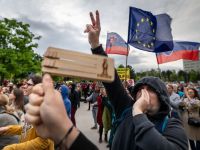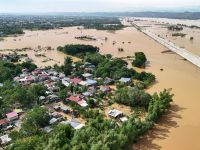Turkey’s Prime Minister Bulent Ecevit is currently on an official visit to the United States.
Turkey, an important strategic ally for the U.S.-led war on terror, appeared Tuesday to be easing its opposition to any possible U.S. attack on Iraq, in the framework of the Superpower’s global campaign against terrorism. Turkey is claiming instead that what matters is Iraq's territorial integrity, according to AP.
Turkey is interested especially in an area located in northern Iraq, currently governed by Iraqi Kurdish groups, since it believes the creation of a Kurdish state there would trigger separatism among Turkey's Kurds.
The new Turkish stance is: "We don't want Iraq to be broken up as part of a military action, but we're not committed to the integrity of Saddam Hussein," said Bulent Aliriza of the Washington-based Center for Strategic and International Studies.
Turkey insists that it has an important role in northern Iraq after any intervention, according to Derya Sazak, a columnist of the Turkish newspaper Milliyet.
Ecevit has opposed any attempt to overthrow Iraqi President Saddam Hussein. The Turkish Prime Minister was ready to highlight the serious financial losses that Turkey went through consequent to the 1991 War against Iraq, Turkey's neighbor. "As a consequence of the Gulf War, Turkey has lost over $50 billion in trade with its neighbors and traditional trading partners," Ecevit announced in a speech to the U.S. Chamber of Commerce.
According to AP, the Turkish Primier is pressing hard in the U.S. capital this week for economic considerations to make the two nations' economic and trade relations as important as their strategic ones.
Ecevit met Tuesday with U.S. Vice President Dick Cheney. They did not specifically talk about Iraq, according to Turkish officials, but Ecevit is expected to discuss the issue on Wednesday in separate meetings with President George W. Bush and Defense Secretary Donald H. Rumsfeld.
In his meeting with Cheney at the White House, Ecevit emphasized the importance of long-term reconstruction aid to Afghanistan. He recommended the founding and training of a national army, which NATO member Turkey is willing to help do.
Cheney, in return, told the Prime Minister, that Washington regards its relationship with Turkey as strategically important, not just for the war on terrorism.
AP adds that Ecevit told Cheney that Turkey wants to see more U.S.-Turkish trade and in particular would like the United States to ease tariffs on Turkish exports. "It has always been our objective to bring our economic and trade relations with the United States up to the level of the existing strategic alliance between our two countries," Ecevit said in his speech at the Chamber. He declared he wants to negotiate establishment of Qualified Industrial Zones, as Washington established in Jordan. Output from the zones enters the United States free of tariffs or quotas.
Ecevit thanked Cheney for U.S. support for loans granted by the International Monetary Fund. The IMF has lent $19 billion to help Turkey out of a grim financial crisis and is expected to lend another $10 billion this year. Turkey also is seeking aid with $5 billion in military debts it has with the United States.
Turkey's importance as an ally of the United States has increased substantially since the September 11 attacks. Ankara is sending troops for the peacekeeping mission in Afghanistan and has offered to take over its leadership when British troops leave. (Albawaba.com)
© 2002 Al Bawaba (www.albawaba.com)







